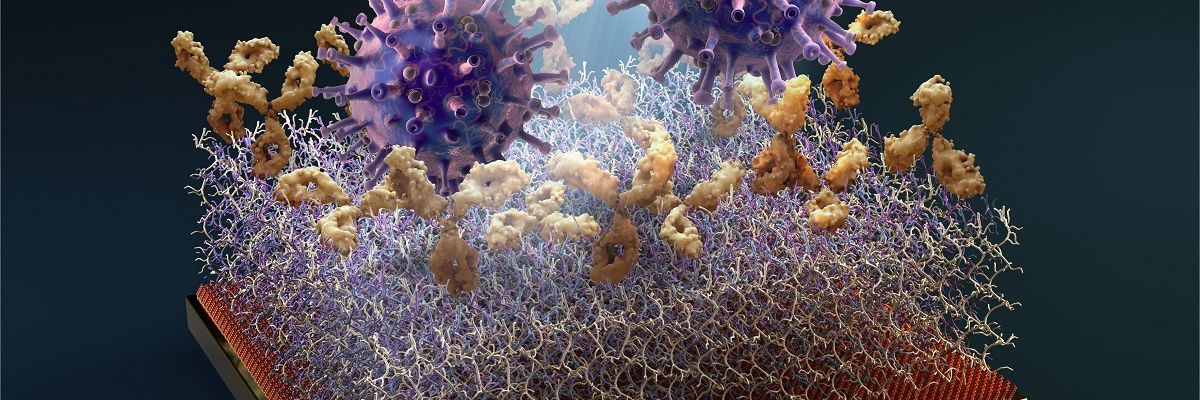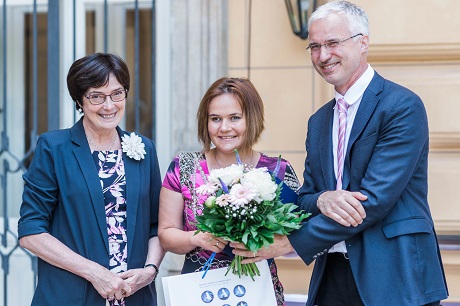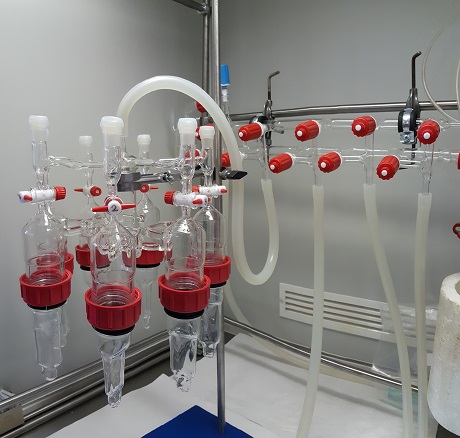
A new biosensor can detect the coronavirus before the start of the formation of antibodies
08. 04. 2020
A technology developed by a team of researchers, led by Hana Lísalová from the Department of Optical and Biophysical Systems of the Institute of Physics of the Czech Academy of Sciences, should enable to detect SARS-COV-2 virus particles directly - in contrast to the demanding detection of antibodies in patients' bodies.
„We have decided to devote our attention to developing a highly-sensitive, transferable biosensor for the detection of coronavirus. This equipment can detect the virus not only in bodily fluids but also in other samples, such as those collected from clothing or water,“ explained Hana Lísalová from the Institute of Physics of the CAS.
The accelerated development of this proposed method has benefitted from an existing cooperative project with the Civil Protection Service of Czech State Police, which aimed to develop a transferable bio-detection system for the rapid detection of pathogens in food.

Hana Lísalová (in the middle), Institute of Physics of the CAS
Using a laboratory prototype, the researchers demonstrated the unique characteristics of the rapid and sensitive detection method. “For example, we were able to detect Escherichia coli, O157:H7, and Salmonella typhi in homogenized hamburger within twenty minutes,” said Alexandr Dejneka, who cooperates on the project with Hana Lísalová. The bacteria were clearly detectable in samples as small as one millilitre. They achieved comparable levels of sensitivity in detecting Hepatovirus A in food samples.
Testing of the system has been arranged with the Institute of Parasitology of the Biological Centre of the Czech Academy of Sciences and the Faculty of Natural Sciences of the South-Bohemian University in České Budějovice.
Versatile technology
These bio-detection systems are based on ultra-resistant polymer surfaces, which are able to retain their functional detection properties under strenuous circumstances, even when used with real biological media. This extremely versatile technology can be relatively easily adapted to many different detection systems to monitor other types of liquid samples. The polymer biochips at the heart of this biosensor can even be re-useable, for example, in the case of a negative response.

Equipment for the development of biochips
If the development of these new biochips proceeds as expected, functional prototypes could be available in a matter of months. In the academic environment, it is possible to ensure the production of hundreds of biochips. In order to acquire more tests and reduce the cost of biochips it would be necessary to scale their production and find a suitable industrial partner.
The personnel and financial expenses of this project - for the accelerated development of a bio-detection system - will be primarily funded by the NCC MATCA or other projects of the Technology Agency of the Czech Republic.
Prepared by: Radka Římanová, Division of External Relations of the CAO of the CAS; Institute of Physics of the CAS
Photo: Daniel Špaček, Neuroncollective.com; Institute of Physics of the CAS; Pavlína Jáchimová, CAS
Read also
- A trapped state: The pandemic impact on public attitudes, trust, and behavior
- Aerial archaeology: Tracing the footsteps of our ancestors from the sky
- Archaeologists uncover ancient finds along Prague Ring Road
- Our microbiome largely depends on what we eat, says microbiologist Michal Kraus
- The ABCs of writing: Why did its invention mark a turning point for humankind?
- We learn, remember, forget… What can memory actually do? And can we outsmart it?
- New Center for Electron Microscopy in Brno opens its doors to global science
- The hidden lives of waste: What can we learn from waste workers and pickers?
- A unique lab is hidden right beneath Prague’s Vítkov Hill
- Renewables are a strategic investment in European security, scientists say
The Czech Academy of Sciences (the CAS)
The mission of the CAS
The primary mission of the CAS is to conduct research in a broad spectrum of natural, technical and social sciences as well as humanities. This research aims to advance progress of scientific knowledge at the international level, considering, however, the specific needs of the Czech society and the national culture.
President of the CAS
Prof. Eva Zažímalová has started her second term of office in May 2021. She is a respected scientist, and a Professor of Plant Anatomy and Physiology.
She is also a part of GCSA of the EU.